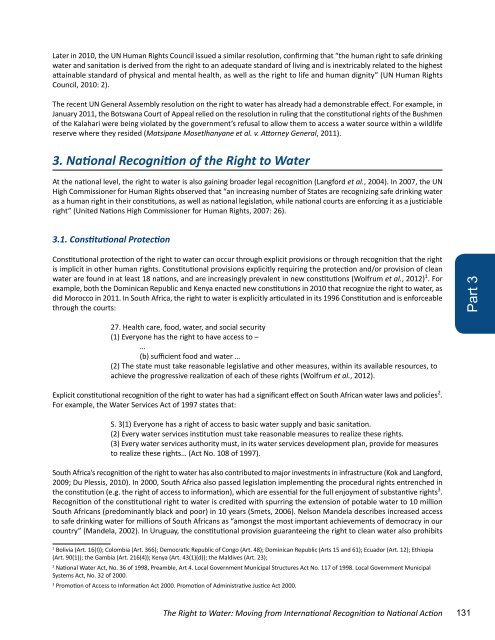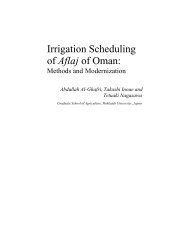The Global Water Crisis: Addressing an Urgent Security - Unu-inweh ...
The Global Water Crisis: Addressing an Urgent Security - Unu-inweh ...
The Global Water Crisis: Addressing an Urgent Security - Unu-inweh ...
Create successful ePaper yourself
Turn your PDF publications into a flip-book with our unique Google optimized e-Paper software.
Later in 2010, the UN Hum<strong>an</strong> Rights Council issued a similar resolution, confirming that “the hum<strong>an</strong> right to safe drinking<br />
water <strong>an</strong>d s<strong>an</strong>itation is derived from the right to <strong>an</strong> adequate st<strong>an</strong>dard of living <strong>an</strong>d is inextricably related to the highest<br />
attainable st<strong>an</strong>dard of physical <strong>an</strong>d mental health, as well as the right to life <strong>an</strong>d hum<strong>an</strong> dignity” (UN Hum<strong>an</strong> Rights<br />
Council, 2010: 2).<br />
<strong>The</strong> recent UN General Assembly resolution on the right to water has already had a demonstrable effect. For example, in<br />
J<strong>an</strong>uary 2011, the Botsw<strong>an</strong>a Court of Appeal relied on the resolution in ruling that the constitutional rights of the Bushmen<br />
of the Kalahari were being violated by the government’s refusal to allow them to access a water source within a wildlife<br />
reserve where they resided (Matsip<strong>an</strong>e Mosetlh<strong>an</strong>y<strong>an</strong>e et al. v. Attorney General, 2011).<br />
3. National Recognition of the Right to <strong>Water</strong><br />
At the national level, the right to water is also gaining broader legal recognition (L<strong>an</strong>gford et al., 2004). In 2007, the UN<br />
High Commissioner for Hum<strong>an</strong> Rights observed that “<strong>an</strong> increasing number of States are recognizing safe drinking water<br />
as a hum<strong>an</strong> right in their constitutions, as well as national legislation, while national courts are enforcing it as a justiciable<br />
right” (United Nations High Commissioner for Hum<strong>an</strong> Rights, 2007: 26).<br />
3.1. Constitutional Protection<br />
Constitutional protection of the right to water c<strong>an</strong> occur through explicit provisions or through recognition that the right<br />
is implicit in other hum<strong>an</strong> rights. Constitutional provisions explicitly requiring the protection <strong>an</strong>d/or provision of cle<strong>an</strong><br />
water are found in at least 18 nations, <strong>an</strong>d are increasingly prevalent in new constitutions (Wolfrum et al., 2012) 1 . For<br />
example, both the Dominic<strong>an</strong> Republic <strong>an</strong>d Kenya enacted new constitutions in 2010 that recognize the right to water, as<br />
did Morocco in 2011. In South Africa, the right to water is explicitly articulated in its 1996 Constitution <strong>an</strong>d is enforceable<br />
through the courts:<br />
27. Health care, food, water, <strong>an</strong>d social security<br />
(1) Everyone has the right to have access to –<br />
…<br />
(b) sufficient food <strong>an</strong>d water …<br />
(2) <strong>The</strong> state must take reasonable legislative <strong>an</strong>d other measures, within its available resources, to<br />
achieve the progressive realization of each of these rights (Wolfrum et al., 2012).<br />
Explicit constitutional recognition of the right to water has had a signific<strong>an</strong>t effect on South Afric<strong>an</strong> water laws <strong>an</strong>d policies 2 .<br />
For example, the <strong>Water</strong> Services Act of 1997 states that:<br />
S. 3(1) Everyone has a right of access to basic water supply <strong>an</strong>d basic s<strong>an</strong>itation.<br />
(2) Every water services institution must take reasonable measures to realize these rights.<br />
(3) Every water services authority must, in its water services development pl<strong>an</strong>, provide for measures<br />
to realize these rights… (Act No. 108 of 1997).<br />
South Africa’s recognition of the right to water has also contributed to major investments in infrastructure (Kok <strong>an</strong>d L<strong>an</strong>gford,<br />
2009; Du Plessis, 2010). In 2000, South Africa also passed legislation implementing the procedural rights entrenched in<br />
the constitution (e.g. the right of access to information), which are essential for the full enjoyment of subst<strong>an</strong>tive rights 3 .<br />
Recognition of the constitutional right to water is credited with spurring the extension of potable water to 10 million<br />
South Afric<strong>an</strong>s (predomin<strong>an</strong>tly black <strong>an</strong>d poor) in 10 years (Smets, 2006). Nelson M<strong>an</strong>dela describes increased access<br />
to safe drinking water for millions of South Afric<strong>an</strong>s as “amongst the most import<strong>an</strong>t achievements of democracy in our<br />
country” (M<strong>an</strong>dela, 2002). In Uruguay, the constitutional provision guar<strong>an</strong>teeing the right to cle<strong>an</strong> water also prohibits<br />
1 Bolivia (Art. 16(I)); Colombia (Art. 366); Democratic Republic of Congo (Art. 48); Dominic<strong>an</strong> Republic (Arts 15 <strong>an</strong>d 61); Ecuador (Art. 12); Ethiopia<br />
(Art. 90(1)); the Gambia (Art. 216(4)); Kenya (Art. 43(1)(d)); the Maldives (Art. 23);<br />
2 National <strong>Water</strong> Act, No. 36 of 1998, Preamble, Art 4. Local Government Municipal Structures Act No. 117 of 1998. Local Government Municipal<br />
Systems Act, No. 32 of 2000.<br />
3 Promotion of Access to Information Act 2000. Promotion of Administrative Justice Act 2000.<br />
<strong>The</strong> Right to <strong>Water</strong>: Moving from International Recognition to National Action<br />
Part 3<br />
131




